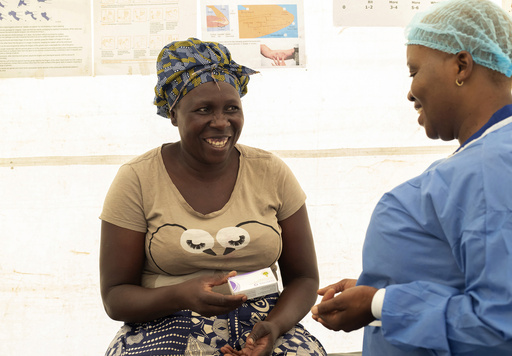
EPWORTH, Zimbabwe — Nineteen-year-old Sithulisiwe Moyo, accompanied by her infant daughter, stood for two hours in line to receive birth-control pills at a mobile clinic stationed in a struggling neighborhood on the outskirts of Harare, the capital of Zimbabwe. For Moyo, the outreach service represents a crucial step towards fulfilling her aspiration of returning to school. “I’m too young to be a baby-making machine,” she expressed, acknowledging that this clinic is integral in helping her avoid further pregnancies.
However, this essential service, funded by the U.S. government — the largest health donor globally — may soon be at risk. With the impending inauguration of U.S. President-elect Donald Trump, there are fears he will reinstate the so-called “global gag rule.” This policy prevents U.S. foreign aid from being used for abortions or for providing information about abortion, which affects funding for vital health services that women depend on worldwide for family planning and general health care.
This gag rule has a complex history spanning over four decades, with Republican presidents often enforcing it while their Democratic counterparts tend to repeal it. Since the mid-1980s, every Republican president has reinstated the Mexico City Policy, named after the city where it was first introduced. Upon his initial term in 2017, Trump expanded the rule, resulting in a loss of approximately $600 million in U.S. family planning funds and over $11 billion in global health aid during 2017 and 2018 alone, as reported by U.S. Government Accountability Office.
Many of these funds were allocated for essential health initiatives in Africa, encompassing efforts to combat malaria and tuberculosis, improve water and sanitation conditions, and distribute crucial health information, as well as contraception. The potential reimplementation of this policy has left women’s health advocates anxious about the future. “We are feeling uneasy,” said Pester Siraha, director of Population Services Zimbabwe, which is associated with MSI Reproductive Choices, an NGO that advocates for abortion rights across 36 countries.
According to the policy, any foreign NGO that receives U.S. government funding must agree to cease all abortion-related services, including even just discussing abortion as a potential family planning option, regardless of the source of the funds being used. MSI did not abide by these stipulations during Trump’s first term, thereby disqualifying itself from U.S. financial support. The repercussions were severe, leading to the closure of outreach clinics that serve as a lifeline for many in rural areas facing poverty and limited access to hospitals.
“This leaves women devoid of options for assistance, even in terms of information,” stated Whitney Chinogwenya, global marketing manager at MSI Reproductive Choices. Many NGOs in various African countries, including Uganda, Ghana, Ethiopia, Kenya, and South Africa, experienced service cutbacks, which included scaling back clinics and support systems for vulnerable populations, including young people and LGBTIQ+ communities.
The shutdown of services led to significant increases in unplanned pregnancies and unsafe abortions in the affected regions, as reported by the Guttmacher Institute, an organization that supports abortion rights. Chinogwenya noted that her organization’s funding fell by $120 million during Trump’s time in office, which translates to an estimated 8 million women worldwide potentially deprived of family planning services, resulting in 6 million unplanned pregnancies and 20,000 maternal deaths.
The reimplementation of the gag rule would exacerbate the cycle of unintended and unwanted pregnancies, according to Catriona Macleod, a psychology professor at Rhodes University in South Africa. “This legislation does not protect lives; it’s been termed as America’s deadly export,” she stated, emphasizing the far-reaching consequences of U.S. policies on women’s health. Attempts to acquire commentary from Trump’s transition team yielded no response.
In 2021, President Joe Biden reversed the gag-rule policy, allowing Population Services Zimbabwe to access $9 million in USAID, accounting for about half of its funding. However, Siraha indicated that the organization has not fully recovered from the losses sustained previously. “Restoration takes time; without consistent support, we risk reversing the progress we have made,” she elaborated. The organization estimates that if the gag rule is reinstated, 1.3 million women in Zimbabwe could find themselves without the necessary care, leading to an additional 461,000 unplanned pregnancies and 1,400 maternal fatalities.
Additionally, cuts in aid from other Western nations compound the challenges of securing alternative funding, as noted by Siraha. MSI Reproductive Choices is advocating for support from global leaders and other donors to protect abortion rights. Chinogwenya articulated that while Trump’s potential reelection might embolden anti-choice movements, the struggle for women’s reproductive rights remains crucial and non-negotiable.
However, NGOs heavily dependent on U.S. funding may face difficult choices, prompting some to adjust their public discussions concerning abortion to remain eligible for funding, according to Denise Horn, an expert in international relations and civil society. In South Africa, where abortion is generally legal, some organizations have refrained from discussing abortion openly or altered their guidelines due to risks associated with funding loss.
The significant queues outside the outreach clinic in Zimbabwe illustrate the critical demand for family planning services especially in impoverished areas. Engeline Mukanya, a 30-year-old mother of three, laments the challenges she faces while supporting her family on a mere $100 monthly income from hairdressing. “It’s regretful that we’re so geographically distant from America, yet its politics still profoundly impact us. All we want is control over when to have our children,” she said, highlighting the urgent need for accessible health services.
